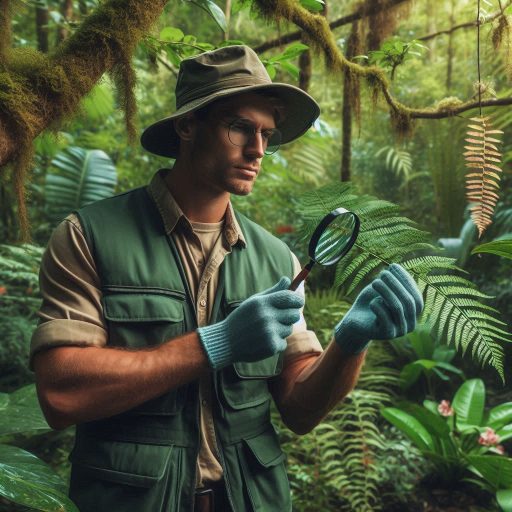Introduction
Ecologists study the relationships between organisms and their environments.
They analyze ecosystems, biodiversity, and the effects of human activities.
Their work is crucial for understanding ecological balance and addressing environmental challenges.
Certifications hold significant importance for ecologists.
They demonstrate expertise, improve job prospects, and enhance credibility in the field.
As environmental issues become more complex, certified professionals are better equipped to develop effective solutions.
Intriguing statistics highlight the growing relevance of ecology.
The U.S. Bureau of Labor Statistics predicts a 5% growth rate for environmental scientists, including ecologists, from 2021 to 2031.
This growth reflects the increasing demand for professionals who can tackle environmental challenges.
Furthermore, over 60% of employers prefer candidates with certifications, showcasing their value in the job market.
As we explore important certifications for ecologists, you will learn how they enhance your knowledge, skills, and career opportunities.
These certifications can set you apart in a competitive field.
By pursuing relevant certifications, you can advance your career and contribute to critical ecological work.
Importance of Certifications
How certifications can enhance job prospects
Certifications play a crucial role in advancing an ecologist’s career by enhancing job prospects.
Employers often seek candidates with relevant certifications, as they signify a higher level of competence and dedication to the field.
Certifications help set candidates apart in competitive job markets, showing they have gone beyond standard education to master specific skills.
This advantage becomes particularly important when applying for specialized positions, such as in wildlife conservation or environmental consulting.
How certifications can demonstrate expertise in specific areas
Earning certifications allows ecologists to showcase their expertise in specialized areas.
Ecology is a broad field, with many sub-disciplines like wetland ecology, habitat restoration, and conservation biology.
By obtaining certifications, ecologists can highlight their proficiency in these particular areas, making them more attractive to employers who need specialized knowledge.
For example, a certification in wetland delineation can qualify an ecologist to work on projects requiring compliance with environmental regulations.
Such focused expertise can be vital for advancing in niche sectors.
Credibility that certifications can provide to ecologists in their field
In the field of ecology, certifications provide significant credibility, demonstrating a commitment to professional development and adherence to industry standards.
Employers, clients, and peers are more likely to trust ecologists who hold certifications, as these credentials represent a level of recognized skill and experience.
Organizations that offer certifications, such as the Ecological Society of America (ESA), set rigorous criteria that ensure certified professionals meet high standards.
Having these credentials can reassure stakeholders that the ecologist has been vetted for their technical knowledge and ethical conduct.
Increases confidence in skills and knowledge
Beyond external benefits, certifications also increase an ecologist’s confidence in their skills and knowledge.
Successfully completing certification programs requires passing exams, completing fieldwork, or meeting professional experience requirements.
This process validates the ecologist’s capabilities, providing assurance that they possess the necessary skills for their chosen field.
Certifications help with career growth and development
Certifications also serve as a roadmap for continued career growth and professional development.
Many certification programs require ongoing education or re-certification, encouraging ecologists to stay current with the latest research and technological advancements.
This requirement for continued learning ensures that certified professionals remain up-to-date and adaptable in a rapidly evolving field.
As a result, certified ecologists can advance to leadership positions, take on more responsibilities, and expand their influence in the ecological community.
Certifications establish professional networks
Finally, certifications often provide opportunities to connect with other professionals in the field.
Many certification programs include membership in professional organizations, which offer networking opportunities, conferences, and access to resources.
These connections can lead to collaboration, mentorship, and career advancement opportunities.
Having a strong professional network is vital for building a successful career in ecology.
Certifications are invaluable for ecologists looking to advance their careers, establish credibility, and gain specialized expertise.
Ecological Society of America Certification
The Ecological Society of America (ESA) offers certifications that validate the skills and knowledge of ecologists.
These certifications serve as a benchmark for professionals in the field, ensuring that they meet high standards of ecological expertise and ethical practice.
What the Certification Entails
The ESA certification assesses an ecologist‘s academic background, field experience, and professional contributions.
It offers three main levels: Ecologist-in-Training, Associate Ecologist, and Certified Senior Ecologist.
Each level requires different qualifications, such as a degree in ecology or a related field, professional experience, and a demonstrated commitment to ecological science.
The Ecologist-in-Training certification is for individuals just starting their careers, often recent graduates.
The Associate Ecologist certification suits those with some experience in the field but who are still building their professional portfolio.
The Certified Senior Ecologist designation is for experienced professionals with extensive contributions to ecological research, education, or policy.
Benefits of ESA Certification for Ecologists
Obtaining ESA certification offers numerous benefits for ecologists.
First, it enhances professional credibility.
Employers, clients, and colleagues recognize ESA certification as a symbol of expertise and commitment to the field.
This can improve career opportunities, particularly in competitive areas like environmental consulting or academic research.
Second, ESA certification provides networking opportunities.
Certified ecologists gain access to ESA‘s extensive professional network, allowing them to collaborate with other experts, attend exclusive events, and stay updated.
Third, the certification opens doors to leadership roles.
Certified Senior Ecologists, in particular, are often sought after for advisory positions, project management, and consulting opportunities.
Their advanced certification signals to employers that they have the experience and knowledge to lead complex ecological projects.
Finally, ESA certification supports continuous learning.
Certified ecologists must maintain their credentials through professional development activities, such as attending conferences, completing courses, or publishing research.
This ensures they stay current with new ecological research and methodologies.
How to Obtain ESA Certification
To obtain ESA certification, candidates must first determine which level suits their experience.
Ecologist-in-Training applicants need a bachelor‘s degree in ecology or a related field, but no professional experience is required.
Associate Ecologists need a minimum of five years of experience in ecological work and a bachelor‘s degree.
Certified Senior Ecologists require at least 10 years of professional experience, a degree, and a substantial record of ecological contributions.
Applicants must submit an application, including a resume, academic transcripts, and letters of recommendation.
They must also provide evidence of their professional contributions, such as published research, project reports, or teaching experience.
The certification committee then reviews the application and makes a decision.
Certification remains valid for five years, after which renewal requires additional documentation of professional development activities.
This process ensures that certified ecologists remain active and engaged in the field.
By obtaining ESA certification, ecologists can solidify their standing as professionals in their field and advance their careers.
Read: Day in the Life: An Environmental Scientist‘s Typical Day
Certified Ecologist (CE) Certification
Requirements for obtaining this certification
The Certified Ecologist (CE) certification is a professional credential that signifies advanced knowledge and skills in ecology.
To obtain this certification, candidates must meet specific educational and professional experience requirements.
First, applicants need at least a bachelor’s degree in ecology, biology, or a related field.
Many candidates, however, pursue advanced degrees to strengthen their qualifications.
Additionally, professional experience is crucial.
Candidates typically need at least five years of practical ecological work experience.
This experience should involve research, fieldwork, or applied ecological practices.
Furthermore, applicants must provide documentation that proves their work experience aligns with the certification‘s requirements.
Lastly, candidates must pass a comprehensive exam that assesses their knowledge of ecological principles and practices.
This exam evaluates a range of topics, from conservation strategies to ecosystem management.
Value of being a Certified Ecologist in the job market
Being a Certified Ecologist significantly enhances an individual’s marketability.
This certification validates your expertise and distinguishes you from others in the field.
Employers, especially those in government agencies, non-profit organizations, and environmental consulting firms, highly value certified professionals.
The CE certification acts as a benchmark, showing employers that you possess the skills needed for complex ecological work.
Moreover, it opens doors to specialized roles.
Certified ecologists often qualify for senior or leadership positions that non-certified candidates may not.
For instance, roles such as Senior Environmental Consultant or Ecological Research Director often require a CE certification.
Beyond securing these positions, having this certification can also lead to higher salaries.
Certified professionals typically earn more due to their advanced qualifications and proven experience.
In an increasingly competitive job market, certifications like the CE demonstrate that you are committed to maintaining professional standards.
This commitment makes you a more attractive candidate for positions in academia, conservation, and environmental policy.
How this certification can help ecologists stand out in the field
The Certified Ecologist (CE) certification helps ecologists stand out by showcasing their dedication to professional development.
Certification demonstrates a high level of competence in key ecological areas such as habitat restoration, biodiversity conservation, and sustainable resource management.
When applying for jobs or grants, this credential can set you apart from other applicants.
Ecologists with CE certification also gain credibility within the scientific community.
This is especially important when leading research projects, publishing studies, or collaborating with other professionals.
Certification signifies that you meet industry standards and follow best practices in ecological research and application.
Additionally, the CE certification provides opportunities for networking.
Certified professionals often become members of respected ecological organizations, gaining access to a network of experts and new research.
This allows certified ecologists to stay updated on the latest trends and techniques in their field.
Ultimately, the CE certification equips ecologists with the tools and recognition needed to excel and make a lasting impact.
Read: Key Roles and Responsibilities of a Chemist in the US
Wildlife Society Certification
Process of obtaining this certification
The Wildlife Society Certification offers ecologists a way to showcase their expertise in wildlife biology and management.
To obtain this certification, candidates must meet specific educational and professional requirements.
First, you need a bachelor’s degree in wildlife biology, ecology, or a related field.
The program requires coursework in subjects like biology, ecology, statistics, and wildlife management.
After meeting educational requirements, candidates must have at least five years of professional experience in wildlife management or research.
Applicants must submit documentation of their experience, including detailed work history, professional references, and a written report on their work.
Finally, the certification process includes a thorough review by a panel of wildlife professionals.
Advantages of Wildlife Society Certification for ecologists
Wildlife Society Certification benefits ecologists by validating their skills and knowledge in wildlife management.
This certification demonstrates that you have met the highest professional standards in your field.
It provides credibility when applying for jobs or securing contracts for research or conservation projects.
Additionally, the certification enhances your professional reputation among peers, colleagues, and potential employers.
By becoming certified, ecologists stand out as experts who adhere to established guidelines and ethics in wildlife management.
It shows that you are committed to staying current with industry standards and continuing education, which is essential in a rapidly changing field.
Certification can also open doors to leadership positions within the wildlife profession.
Employers recognize the Wildlife Society Certification as a mark of competence and dedication.
Obtaining this certification not only advances your career but also helps in networking with other professionals in the field.
Examples of career opportunities that this certification can lead to
The Wildlife Society Certification can significantly boost your career prospects in the field of ecology and wildlife management.
Certified ecologists often qualify for more advanced roles in government agencies, where they may manage large-scale wildlife conservation projects.
You can also find opportunities with state wildlife agencies, where certified professionals are hired to develop and implement wildlife conservation plans.
Certification can also pave the way for ecologists to work as consultants, providing expert advice on wildlife management, habitat conservation, etc.
Additionally, academic institutions may seek certified ecologists to lead research programs or teach wildlife biology.
Wildlife Society Certification significantly enhances career advancement, job security, and opportunities for leadership in the ecology and wildlife management fields.
Read: The Impact of Technology on the Chemist Profession in the US
Transform Your Career Today
Unlock a personalized career strategy that drives real results. Get tailored advice and a roadmap designed just for you.
Start Now
Gain More Insights: Top Universities for Materials Science Degrees
Certified Wildlife Biologist (CWB) Certification
Qualifications Needed to Obtain CWB Certification
The Certified Wildlife Biologist (CWB) certification is a prestigious credential in the field of ecology.
To obtain this certification, candidates must meet specific educational and experiential qualifications.
Generally, a candidate needs a bachelor’s degree in wildlife biology, ecology, or a related field.
Advanced degrees, such as a master’s or PhD, can also be beneficial.
In addition to educational qualifications, candidates need practical experience in wildlife management or research.
Most candidates must accumulate at least three years of professional experience working with wildlife.
They also need to demonstrate knowledge of key concepts in wildlife biology and management.
Candidates must pass a rigorous examination covering various aspects of wildlife biology, including ecology, physiology, and conservation techniques.
Significance of Being a Certified Wildlife Biologist
Achieving CWB certification holds significant importance for wildlife professionals.
First, it signifies a commitment to high standards of professionalism and ethical practice.
This certification indicates that an ecologist possesses comprehensive knowledge in wildlife biology.
It assures employers and colleagues that the certified individual adheres to best practices in the field.
Being a Certified Wildlife Biologist enhances an ecologist’s credibility.
It demonstrates expertise and a dedication to continued learning.
Professionals with this certification often gain a competitive edge in the job market.
Employers frequently prefer candidates with CWB certification for positions in wildlife management, conservation, and research.
Impact on an Ecologist’s Career
Additionally, certified professionals can access various resources and networking opportunities.
The Wildlife Society, the organization that offers the CWB certification, provides support for continuing education.
Certified Wildlife Biologists can participate in workshops, seminars, and conferences to further develop their skills.
The CWB certification can also impact an ecologist’s career trajectory.
Many organizations and agencies value certification when making hiring decisions or promoting staff.
Certified professionals often command higher salaries compared to non-certified colleagues.
This credential can open doors to leadership positions in wildlife management and conservation efforts.
Furthermore, the certification encourages ongoing professional development.
Certified Wildlife Biologists must complete continuing education credits to maintain their certification.
This requirement ensures that they stay updated on the latest research and techniques in wildlife biology.
It fosters a culture of lifelong learning among wildlife professionals.
The CWB certification ultimately contributes to better conservation practices.
Certified professionals are often at the forefront of implementing effective wildlife management strategies.
They play a vital role in preserving biodiversity and protecting ecosystems.
This certification empowers ecologists to make a significant impact in their field.
The Certified Wildlife Biologist certification is a valuable asset for ecologists.
It signifies a commitment to professionalism, enhances credibility, and positively impacts career opportunities.
By obtaining this certification, wildlife professionals position themselves for success in the ever-evolving field of ecology.
Read: US Chemistry Conferences and Symposiums to Attend in 2024
You Might Also Like: Government Funding for Immunology Projects
Other Relevant Certifications for Ecologists
Additional Certifications Beneficial for Ecologists
In addition to the Certified Wildlife Biologist (CWB) certification, several other certifications can benefit ecologists.
These credentials enhance knowledge and demonstrate expertise in specific areas of ecology.
One notable certification is the Ecological Restoration Certification (ERC).
This certification is ideal for professionals involved in restoring ecosystems.
It ensures that individuals understand the principles and practices of ecological restoration.
Another valuable certification is the Certified Environmental Professional (CEP).
This credential is beneficial for ecologists working in environmental consulting and management.
The CEP certification focuses on environmental regulations, policy, and project management.
For those interested in environmental education and outreach, the National Environmental Education Certification can be advantageous.
This certification focuses on teaching methods and educational strategies related to environmental topics.
Certifications Related to Specific Niches
Many ecologists specialize in particular niches within the field.
Several certifications cater to these specific interests.
For instance, the Certified Fisheries Professional (CFP) certification is tailored for those working in aquatic ecosystems and fisheries management.
It emphasizes knowledge of aquatic biology and sustainable management practices.
Similarly, the Certified Arborist credential benefits ecologists focusing on tree care and urban forestry.
This certification covers tree biology, identification, and management practices.
Another example is the Wetland Professional Certification.
This certification is valuable for professionals working in wetland conservation and management.
It validates knowledge of wetland ecology and regulatory practices.
Importance of Continuous Learning and Skill Development
Continuous learning and skill development through certifications are essential in the field of ecology.
The landscape of ecological research and management evolves rapidly.
New methodologies, technologies, and regulations emerge frequently.
Therefore, ecologists must stay updated to remain effective in their roles.
Pursuing additional certifications demonstrates a commitment to professional growth.
It allows ecologists to deepen their understanding of specialized topics.
These credentials can also enhance employability and career advancement opportunities.
Many employers prioritize candidates who actively seek out new knowledge and skills.
Moreover, participating in certification programs often includes networking opportunities.
These connections can lead to collaborations and partnerships that enrich an ecologist’s career.
Several certifications are relevant for ecologists seeking to advance their careers.
From ecological restoration to fisheries management, various options cater to different niches.
Continuous learning and skill development are crucial in this dynamic field.
By pursuing relevant certifications, ecologists can enhance their expertise, broaden their career prospects, and contribute to effective environmental stewardship.
Conclusion
Pursuing certifications significantly benefits ecologists in their professional journeys.
Relevant certifications enhance knowledge and skills, demonstrating expertise to potential employers.
They offer valuable insights into specialized areas within ecology, promoting career advancement.
Certifications like the Certified Wildlife Biologist (CWB) and Certified Environmental Professional (CEP) are noteworthy.
These credentials provide a competitive edge in the job market.
They also improve networking opportunities within the ecological community.
Continuous learning is essential in this dynamic field.
Certifications encourage ecologists to stay updated on the latest trends and research.
They foster a commitment to professional development and lifelong learning.
We encourage readers to explore various certification options.
Assess your interests and career goals to identify suitable certifications.
Investing time and resources in your education can yield significant returns in your career.
Take the initiative to enhance your skills and knowledge through certification programs.
Your dedication to professional growth will enrich your contributions to the field of ecology.
Start your journey toward certification today and unlock new opportunities in your career!




